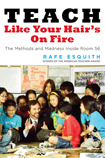 I'm a sucker for stories about triumphant teachers who overcome great odds and transform lives. An oldie but goodie is Rafe Esquith's "Teach Like Your Hair's on Fire." For those of you who haven't yet read the book, Rafe teaches fifth grade in Los Angeles in a huge inner city school with remarkable results; his students routinely test in the top 5-10 percent while the average 3rd grader in his school tests in the bottom 20\ percent. Rafe claims the difference is simply lots of extra time doing hard work. He and his kids are in his classroom from 6:30 a.m. to dinner time every day, in a year round school, on weekends and during vacations. Everything they do, from performing Shakespeare, to class trips, to life in the classroom, is a teachable moment. Rafe's students are, for the most part, the children of immigrants, and his classroom is their escape route from poverty to the American dream.
I'm a sucker for stories about triumphant teachers who overcome great odds and transform lives. An oldie but goodie is Rafe Esquith's "Teach Like Your Hair's on Fire." For those of you who haven't yet read the book, Rafe teaches fifth grade in Los Angeles in a huge inner city school with remarkable results; his students routinely test in the top 5-10 percent while the average 3rd grader in his school tests in the bottom 20\ percent. Rafe claims the difference is simply lots of extra time doing hard work. He and his kids are in his classroom from 6:30 a.m. to dinner time every day, in a year round school, on weekends and during vacations. Everything they do, from performing Shakespeare, to class trips, to life in the classroom, is a teachable moment. Rafe's students are, for the most part, the children of immigrants, and his classroom is their escape route from poverty to the American dream.If all teachers were as dedicated as Rafe Esquith, education in this country wouldn't be in trouble. If only there were a way to capture his essence, bottle it, and make it accessible to all teachers. But unfortunately, according to Rafe, there are no shortcuts. He can impact only about 30 students a year.
Like many other nonfiction authors, I started out as a teacher who wanted to share my enthusiasm for science with my students. As a young junior high science teacher, I had 150 students, 5 classes and 3 preparations a day. Teaching was a whirlwind job! There was never any time to stop and think how to present material so that my students would be blown away by the audacity of the ideas and concepts that scientists had labored so long and hard to produce. In fact, stopping and thinking doesn't seem to be a part of the job description for most active teachers, Rafe Esquith excepted. And that explains why I became a writer.
It is the creative nonfiction author's job to stop and think. We dwell on the big ideas to find ways of presenting them so that kids get it and get excited about them. Just as there are no shortcuts to good teaching, good writing takes insightfulness into one's subject, craft, knowledge of one's readers, and above all time. It always amazes me that even when I write in white heat, when the words pour forth effortlessly, cooler reflection the next day shows me how to restate things with more clarity and power. And when words come like blood from a stone, when I'm just going through the motions to get something, anything, down I'm just as amazed upon rereading my efforts the next day to find that my words don't seem labored. Over the years, by working day in, day out I have created a body of work.
Original nonfiction for kids showcases individual "takes" on the real world. An encyclopedia or textbook can recite the facts about a subject. Our books show how we experience a subject. It's the difference between a travelogue about southern France or Peter Mayle's "A Year in Provence." By putting the facts in context, by creating a conceptual framework, by understanding how to speak to our audience, by our selection of what to include and what to exclude, our books are nothing less than good teaching already bottled and preserved, ready to be consumed.
To learn more, go to our blog Interesting Nonfiction for Kids (I.N.K.)



Leave a comment